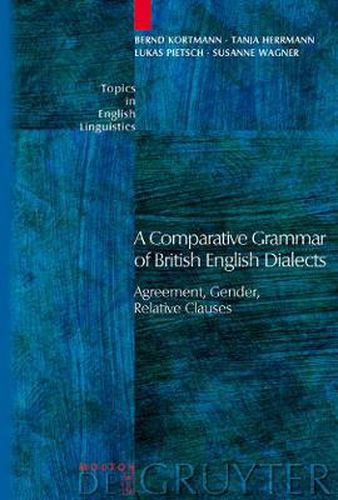Readings Newsletter
Become a Readings Member to make your shopping experience even easier.
Sign in or sign up for free!
You’re not far away from qualifying for FREE standard shipping within Australia
You’ve qualified for FREE standard shipping within Australia
The cart is loading…






This volume offers qualitative as well as corpus-based quantitative studies on three domains of grammatical variation in the British Isles. All studies draw heavily on the Freiburg English Dialect Corpus (FRED), a computerized corpus for predominantly British English dialects comprising some 2.5 million words. Besides an account of FRED and the advantages which a functionaltypological framework offers for the study of dialect grammar, the volume includes the following three substantial studies. Tanja Hermann’s study is the first systematic cross-regional study of relativization strategies for Scotland, Northern Ireland, and four major dialect areas in England. In her research design Hermann has included a number of issues crucial in typological research on relative clauses, above all the Noun Phrase Accessibility Hierarchy. Lukas Pietsch investigates the so-called Northern Subject Rule, a special agreement phenomenon known from Northern England, Scotland and Northern Ireland. His study is primarily based on the Northern Ireland Transcribed Corpus of Speech, but also on the FRED and SED data (Survey of English Dialects) for the North of England. Susanne Wagner is concerned with the phenomenon of pronominal gender, focussing especially on the typologically rather unique semantic gender system in the dialects of Southwest England. This volume will be of interest to dialectologists, sociolinguists, typologists, historical linguists, grammarians, and anyone interested in the structure of spontaneous spoken English.
$9.00 standard shipping within Australia
FREE standard shipping within Australia for orders over $100.00
Express & International shipping calculated at checkout
This volume offers qualitative as well as corpus-based quantitative studies on three domains of grammatical variation in the British Isles. All studies draw heavily on the Freiburg English Dialect Corpus (FRED), a computerized corpus for predominantly British English dialects comprising some 2.5 million words. Besides an account of FRED and the advantages which a functionaltypological framework offers for the study of dialect grammar, the volume includes the following three substantial studies. Tanja Hermann’s study is the first systematic cross-regional study of relativization strategies for Scotland, Northern Ireland, and four major dialect areas in England. In her research design Hermann has included a number of issues crucial in typological research on relative clauses, above all the Noun Phrase Accessibility Hierarchy. Lukas Pietsch investigates the so-called Northern Subject Rule, a special agreement phenomenon known from Northern England, Scotland and Northern Ireland. His study is primarily based on the Northern Ireland Transcribed Corpus of Speech, but also on the FRED and SED data (Survey of English Dialects) for the North of England. Susanne Wagner is concerned with the phenomenon of pronominal gender, focussing especially on the typologically rather unique semantic gender system in the dialects of Southwest England. This volume will be of interest to dialectologists, sociolinguists, typologists, historical linguists, grammarians, and anyone interested in the structure of spontaneous spoken English.